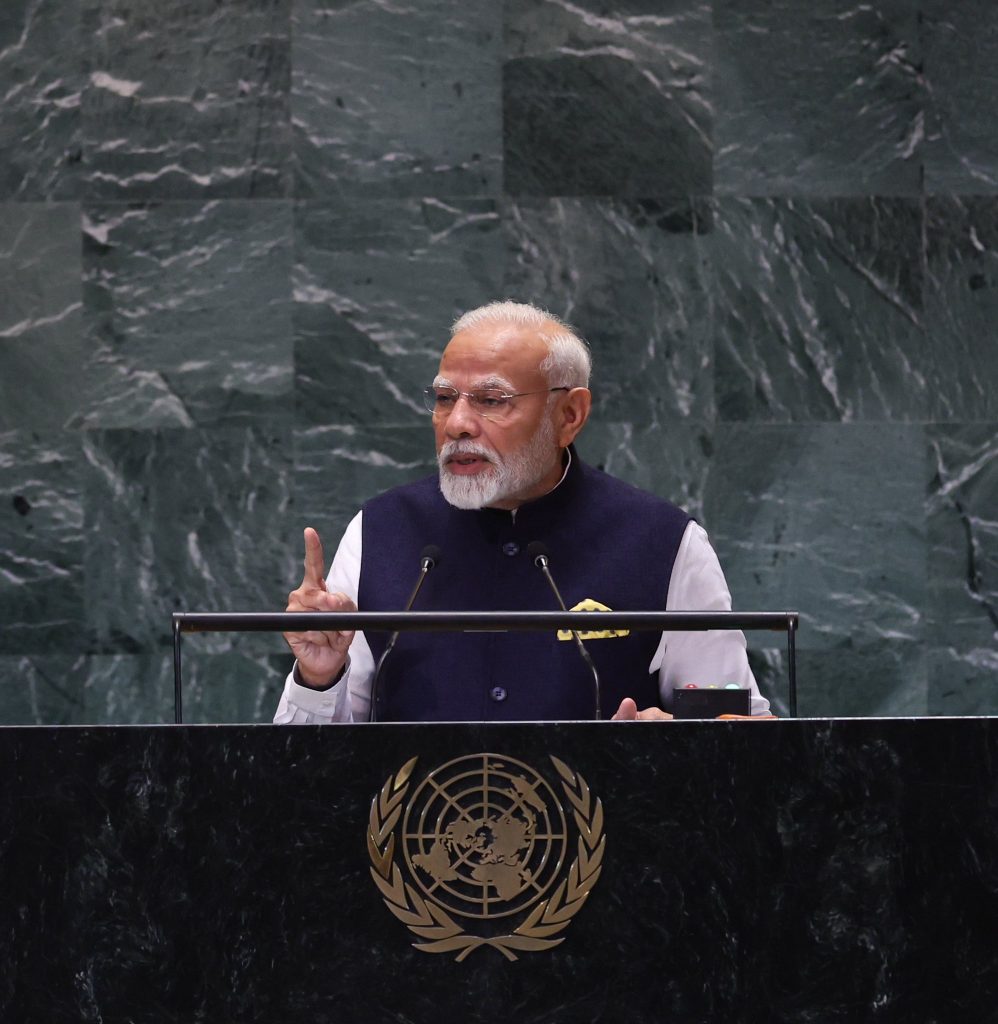
UNITED NATIONS: In his soaring address at the UN Summit of the Future, Prime Minister Narendra Modi batted for peace and called for accelerating the UN reforms amid a slew of crises and conflicts in the world.
Opening his speech, Modi underscored the importance of unity over conflict, a statement that seemed to allude to ongoing global crises, including the Russia-Ukraine war. “Success of humanity lies in our collective strengths, not on the battlefield,” he declared, urging world leaders to prioritize peaceful cooperation over competition in the evolving global order.
Striking a note of urgency, Prime Minister Narendra Modi emphasised the need for collective action and reforms in global governance to address the challenges humanity faces today. Speaking on behalf of 1.4 billion Indians and representing the world’s largest democracy, Modi articulated a strong message advocating for a “human-centric approach” to sustainable development, peace, and technological progress.
He pressed the necessity for reforms in international institutions to maintain their relevance. He hailed the African Union’s permanent membership in the G20, achieved at the New Delhi Summit, as a landmark step. “Reform is the key to relevance,” Modi asserted, emphasizing that changes in global governance structures are essential for ensuring peace and development in a fast-changing world.
Global South
India’s efforts in poverty alleviation featured prominently in Modi’s remarks, with Prime Minister Modi highlighting that 250 million people had been lifted out of poverty. He offered India’s experience as a model for other developing nations, particularly those in the Global South. “We have demonstrated that sustainable development can be successful,” he said, reiterating India’s willingness to share its strategies and resources with nations facing similar challenges.
Technology for Global Good
In an era where technological advancements can both bridge and divide, PM Modi called for balanced regulation in the use of technology. He stressed that global digital governance should ensure the sovereignty and integrity of nations while promoting global welfare. “Digital Public Infrastructure should be a bridge, not a barrier,” Modi remarked, offering India’s digital frameworks as tools for global collaboration.
India’s readiness to share its digital public infrastructure globally marks another major initiative in its diplomacy. According to Modi, “India is ready to share its digital public infrastructure with the entire world,” underscoring the potential of such systems to serve as platforms for global development and cooperation.
New Threats
As new conflict areas such as cyber, maritime, and space domains emerge, Modi stressed the need for comprehensive global action to match the scale of these challenges. “While on one hand, terrorism continues to be a serious threat to global peace and security, on the other hand, areas such as cyber, maritime, and space are emerging as new theatres of conflict,” he warned. His call for collective action reinforced India’s stance on maintaining international peace and security through collaborative and decisive efforts.
One Earth, One Family, One Future
PM Modi also emphasized India’s commitment to global well-being, encapsulated in the philosophy of “One Earth, One Family, One Future.” This message resonates with India’s broader initiatives like “One Earth, One Health” and “One Sun, One World, One Grid,” aimed at addressing global health and energy concerns through coordinated action.
PM Modi concluded his speech by reaffirming India’s dedication to working for global prosperity and the rights of all humanity. “India will continue to work in thought, words, and deeds to protect the rights of all humanity and for global prosperity,” he assured the assembly, sending a strong message of India’s role as a responsible global leader in an interconnected world.
In this address, PM Modi laid out a vision for the future built on collective strength, reformed global institutions, and shared technological progress—offering India’s experience and resources as key contributions to a more sustainable and peaceful world.
(Ananya Singh and Kartike Garg contributed inputs for this article)
Author Profile

- Manish Chand is Founder and Editor-in-Chief of India Writes Network (www.indiawrites.org) and India and World, a pioneering magazine focused on international affairs. He is CEO, Centre for Global India Insights, an India-based think tank focused on global affairs.
Latest entries
 India and the WorldFebruary 17, 2026South-by-South: Focus on people-centric solutions at India AI summit
India and the WorldFebruary 17, 2026South-by-South: Focus on people-centric solutions at India AI summit India and the WorldFebruary 7, 2026Modi hails interim India-US trade deal, Goyal says no concessions made on agriculture
India and the WorldFebruary 7, 2026Modi hails interim India-US trade deal, Goyal says no concessions made on agriculture India and the WorldFebruary 2, 2026Trump announces trade deal with India, Modi ‘delighted’
India and the WorldFebruary 2, 2026Trump announces trade deal with India, Modi ‘delighted’ India and the WorldJanuary 31, 2026Palestinian minister bats for mediatory role for India in ending Gaza conflict
India and the WorldJanuary 31, 2026Palestinian minister bats for mediatory role for India in ending Gaza conflict







